7 books about Foreign trade and employment

The Changing Nature of Work
Edited by Frank Ackerman, Neva R. Goodwin, Laurie Dougherty, and Kevin Gallagher; Foreword by Robert Reich
Island Press, 1998
Human impacts on the environment are largely driven by economic forces. If a more ecologically sustainable world is to be achieved, significant changes must be made to the current growth- and consumption-dependent economic system. The Frontier Issues in Economic Thought series was designed to assist the growing number of economists and others who are responding to the need for new thinking about economics in the face of environmental and social forces that are reshaping the world.The Changing Nature of Work examines the causes and effects of the rapid transformation of the world of work. It provides concise summaries of the key writings on work and workplace issues, extending the frontiers of labor economics to include the often overlooked social and psychological dimensions of work.The book begins with a foreword by former Secretary of Labor Robert Reich that presents labor in contemporary perspective. An introductory overview provides a brief history of the changing nature of work and situates current problems in the context of longer-term developments. Following that are eight topical sections that feature three- to five-page summaries for each of the ten to twelve most important articles or book chapters on a subject.Sections cover.new directions in labor economics social and psychological dimensions of work and unemployment globalization and labor new technologies and organizational change flexibility and internal labor markets new patterns of industrial relations family, gender, paid and unpaid work difference and diversity in the workplaceThe book provides a roadmap for scholars on the vast and diverse literature concerning labor issues, and affords students a quick overview of that rapidly changing field. It is an important contribution to the series and is a valuable book for anyone interested in labor, as well as for students and scholars of labor economics, industrial sociology, industrial relations, social psychology, and their respective disciplines.
[more]
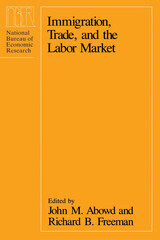
Immigration, Trade, and the Labor Market
Edited by John M. Abowd and Richard B. Freeman
University of Chicago Press, 1991
Are immigrants squeezing Americans out of the work force? Or is competition wth foreign products imported by the United States an even greater danger to those employed in some industries? How do wages and unions fare in foreign-owned firms? And are the media's claims about the number of illegal immigrants misleading?
Prompted by the growing internationalization of the U.S. labor market since the 1970s, contributors to Immigration, Trade, and the Labor Market provide an innovative and comprehensive analysis of the labor market impact of the international movements of people, goods, and capital. Their provocative findings are brought into perspective by studies of two other major immigrant-recipient countries, Canada and Australia. The differing experiences of each nation stress the degree to which labor market institutions and economic policies can condition the effect of immigration and trade on economic outcomes
Contributors trace the flow of immigrants by comparing the labor market and migration behavior of individual immigrants, explore the effects of immigration on wages and employment by comparing the composition of the work force in local labor markets, and analyze the impact of trade on labor markets in different industries. A unique data set was developed especially for this study—ranging from an effort to link exports/imports with wages and employment in manufacturing industries, to a survey of illegal Mexican immigrants in the San Diego area—which will prove enormously valuable for future research.
Prompted by the growing internationalization of the U.S. labor market since the 1970s, contributors to Immigration, Trade, and the Labor Market provide an innovative and comprehensive analysis of the labor market impact of the international movements of people, goods, and capital. Their provocative findings are brought into perspective by studies of two other major immigrant-recipient countries, Canada and Australia. The differing experiences of each nation stress the degree to which labor market institutions and economic policies can condition the effect of immigration and trade on economic outcomes
Contributors trace the flow of immigrants by comparing the labor market and migration behavior of individual immigrants, explore the effects of immigration on wages and employment by comparing the composition of the work force in local labor markets, and analyze the impact of trade on labor markets in different industries. A unique data set was developed especially for this study—ranging from an effort to link exports/imports with wages and employment in manufacturing industries, to a survey of illegal Mexican immigrants in the San Diego area—which will prove enormously valuable for future research.
[more]
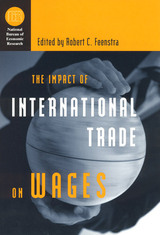
The Impact of International Trade on Wages
Edited by Robert C. Feenstra
University of Chicago Press, 2000
Since the early 1980s, the U.S. economy has experienced a growing wage differential: high-skilled workers have claimed an increasing share of available income, while low-skilled workers have seen an absolute decline in real wages. How and why this disparity has arisen is a matter of ongoing debate among policymakers and economists. Two competing theories have emerged to explain this phenomenon, one focusing on international trade and labor market globalization as the driving force behind the devaluation of low-skill jobs, and the other focusing on the role of technological change as a catalyst for the escalation of high-skill wages.
This collection brings together innovative new ideas and data sources in order to provide more satisfying alternatives to the trade versus technology debate and to assess directly the specific impact of international trade on U.S. wages. This timely volume offers a thorough appraisal of the wage distribution predicament, examining the continued effects of technology and globalization on the labor market.
This collection brings together innovative new ideas and data sources in order to provide more satisfying alternatives to the trade versus technology debate and to assess directly the specific impact of international trade on U.S. wages. This timely volume offers a thorough appraisal of the wage distribution predicament, examining the continued effects of technology and globalization on the labor market.
[more]
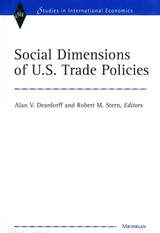
Social Dimensions of U.S. Trade Policies
Alan V. Deardorff and Robert M. Stern, Editors
University of Michigan Press, 2000
The contributors to this volume include numerous members of the trade policy community who analyze and discuss the salient social dimensions of U.S. trade policies. These issues include the effects of trade on wage inequality; trade and immigration policy; U.S. trade adjustment assistance policies; the effects of NAFTA on environmental quality; the role of labor standards in U.S. trade policies; the economics of labor standards and the GATT; issues of child labor; and the role of interest groups in the design and implementation of U.S. trade policies.
Chapter authors are Kyle Bagwell, Claude Barfield, George J. Borjas, Drusilla K. Brown, Alan V. Deardorff, Nancy Dunne, Gary S. Fields, John Kirton, Mike Jendrzejczyk, Phyllis Shearer Jones, Edward E. Leamer, Robert Naiman, Gregory K. Schoepfle, Robert W. Staiger, and Robert M. Stern.
Commenters are Steve Beckman, Jagdish Bhagwati, Alan V. Deardorff, Avinash Dixit, Pharis Harvey, David van Hoogstraten, John H. Jackson, Lawrence Mishel, Jack Otero, J. David Richardson, Dani Rodrik, Mark Silbergeld, and T. N. Srinivasan.
Alan V. Deardorff and Robert M. Stern are Professors of Economics and Public Policy, University of Michigan.
[more]
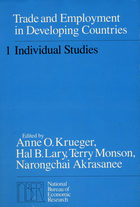
Trade and Employment in Developing Countries, Volume 1
Individual Studies
Edited by Anne O. Krueger, Hal B. Lary, Terry Monson, and Narongchai Akrasanee
University of Chicago Press, 1980
This first book of a three-volume study examines the way trade policies in developing countries affect the level and composition of employment. There is special emphasis on the effects of import substitution policies that attempt to make a country self-sufficient by producing local substitutes for imports, as compared with policies that further the expansion of imports.
Ten countries are studied: Brazil, Chile, Colombia, Indonesia, the Ivory Coast, Pakistan, South Korea, Thailand, Tunisia, and Uruguay. The contributors to the volume analyze the link between trade strategies and employment within a common framework, and the analyses of trade policy include the level and structure of protection, the relation of trade policy to labor demand, the labor intensiveness of trade, and the extent of distortions in factor markets and their effects on trade.
Ten countries are studied: Brazil, Chile, Colombia, Indonesia, the Ivory Coast, Pakistan, South Korea, Thailand, Tunisia, and Uruguay. The contributors to the volume analyze the link between trade strategies and employment within a common framework, and the analyses of trade policy include the level and structure of protection, the relation of trade policy to labor demand, the labor intensiveness of trade, and the extent of distortions in factor markets and their effects on trade.
[more]
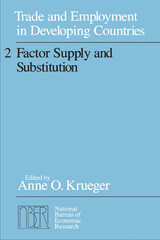
Trade and Employment in Developing Countries, Volume 2
Factor Supply and Substitution
Edited by Anne O. Krueger
University of Chicago Press, 1982
Factor Supply and Substitution, the second in a three-volume study entitled Trade and Employment in Developing Countries, extends the analysis of trade regimes and employment both in depth for single countries and through cross-country analyses. It provides important new evidence of the effects of different trade policies and of the effects of the various factors that make up these policies—exchange rates, wages, social insurance and other taxes, credit, prices, and so on. All six studies reflect a carefully coordinated research strategy that has been carried out by a first-rate team. The researchers combine technical expertise with specialized knowledge of the individual countries.
[more]
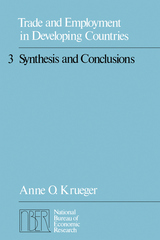
Trade and Employment in Developing Countries, Volume 3
Synthesis and Conclusions
Anne O. Krueger
University of Chicago Press, 1988
The NBER project on alternative trade strategies and employment analyzed the extent to which employment and income distribution are affected by the choice of trade strategies and by the interaction of trade policies with domestic policies and market distortions. This book, the third and final volume to come from that project, brings together the theory underlying the trade strategies-employment relation and the empirical evidence emanating from the project.
[more]
READERS
Browse our collection.
PUBLISHERS
See BiblioVault's publisher services.
STUDENT SERVICES
Files for college accessibility offices.
UChicago Accessibility Resources
home | accessibility | search | about | contact us
BiblioVault ® 2001 - 2024
The University of Chicago Press









